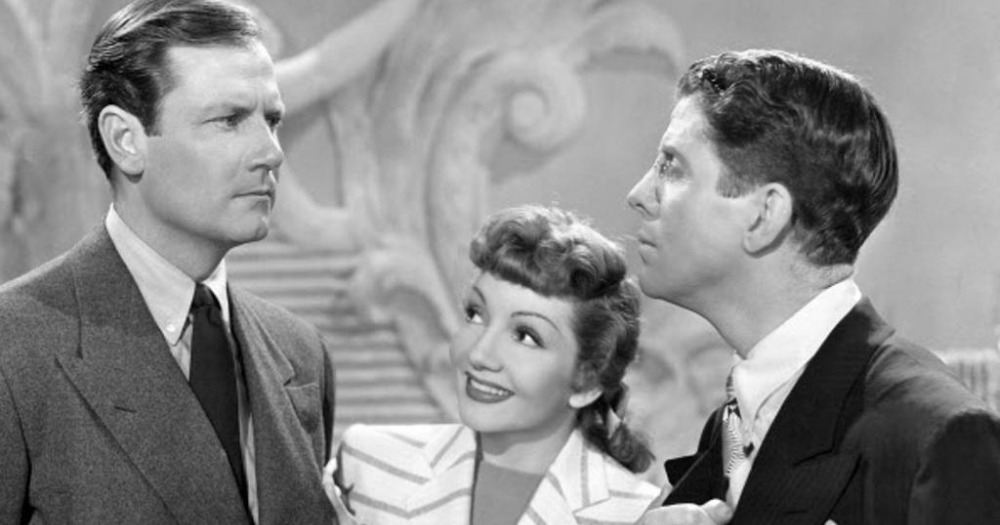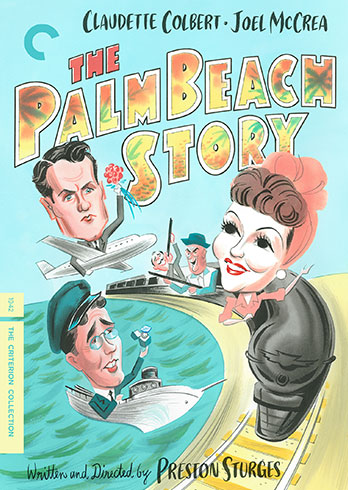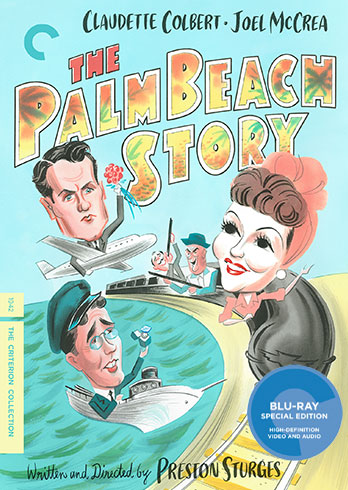
As the first true auteur to emerge from within the Hollywood studio system when that industry was operating at peak proficiency in its Golden Age, Preston Sturges holds a unique place in film history. He rose from the ranks of the lowly screenwriters, generally considered easily replaceable parts, if not outright hacks, for the most part by the titans of Tinseltown, parlaying his success as a Broadway playwright and a cobbler of amusing, energetic and award-winning screenplays into a directorial gig that still seems equally audacious and miraculous when one takes a bit of time to study up on the man’s career. That unique (at the time) trajectory blazed a trail that many great talents have followed over the past seven decades since he burst upon the scene, but Sturges still established an impressive and referential standard, in both proficiency and in multi-leveled complexity and intrigue, over the course of the 1940s. Much like the classic comedies that he wrote and directed, single-handed and with an enduring charismatic flair, there’s a lot more to examine and appreciate about the life and work of Preston Sturges than might initially register upon first impression.
So it’s more than fitting that the Criterion Collection has finally gotten around to presenting at least a pair (but hopefully more in the months ahead) of his hilarious masterworks in the Blu-ray format. Of course, they were hip to Sturges way back when, releasing The Lady Eve and Sullivan’s Travels in 2001 and his last great film Unfaithfully Yours a few years later, all on DVD. Now with the recent release of The Palm Beach Story, which was Sturges’ follow up to Sullivan’s Travels, itself about be reissued in April, a new generation of cinephiles will have a chance to enjoy a lot of laughs and see for themselves what made this writer/director such an influential creative force, in sharp, state of the art presentations.
Following up on the late 2014 release of It Happened One Night, it also looks like Criterion might be embarking on a prolonged exploration of so-called “screwball comedies,” somewhat similar to the uptick in releases of Westerns that we’ve seen over the past few years. At least, one can only hope. This sub-genre, generally built on the concept of lovers who are at least on the surface mismatched for each other, who endure a crisis often involving mixed, confused or assumed identities, and who find a happy (but frequently implausible, in real world terms) resolution at the end of the story, has generated a lot of faithful fans over the years. The combination of snappy dialogue, lively pacing, sharp wit and sweet romanticism despite the occasional overtones of wry cynicism, developed in a hothouse environment, when the great Hollywood studios were pumping out a lot of product, basically supplying the entertainment needs of an entire nation and an even broader global audience. The restrictions of the Hays Code certainly curbed the direction that a lot of stories could go, and all too often imposed ridiculous and incongruous happy endings into the final acts of many otherwise excellent films. But for free spirits like Sturges, the limits imposed upon him functioned as a kind of dare, which he responded to by pressing his thoughts about marital infidelity and other aspects of human sexuality into clever double-entendres that sometimes didn’t fully blossom into the viewer’s imagination until they’d been pondered a little more fully. For example, take the line of one of the main characters in The Palm Beach Story: “That’s one of the tragedies of this life – that the men who are most in need of a beating up are always enormous.” The first response is to chuckle over the familiar frustration that the victims of bullies and aggressive louts often feel. But hold that thought… let it sink in a little, especially if you’re familiar with the context of the quote. There, you get it now, I need say no more, at least along that line.
But what I will say about The Palm Beach Story itself is that it’s a very welcome addition to the Sturges offerings that Criterion has made available. The story involves a Manhattan couple whose marriage has hit the skids due to the husband Tom’s inability to turn any of his crackpot inventions into a steady cash flow. His wife Gerry hasn’t exactly lost her love and affection for her husband, but she feels useless as a wife, unable to find satisfaction in the domestic duties that she feels obliged to perform. After coming into a sudden windfall of cash, just enough to pay their overdue rent and a few other indulgences thanks to the largess of an amusing old coot who calls himself the Wienie King, Gerry’s peculiar solution to their dilemma is to make herself single again so that she can use her considerable feminine wiles to find a rich new husband, with the ostensible goal of funneling some of the money she gets access to in the direction of her soon-to-be ex-husband so that he can get the financial backing he needs to make his inventions a reality.
It’s an odd plan, to be sure, but it serves as a perfect premise for Sturges to explore this idea of how “easy” women have it making their way in the world, if they’re fortunate enough to be the long-legged, attractive and sexually confident type who can beguile men from any and every station of life with flirtatious looks, a whimper of helplessness and, if necessary, a little flash of the skin here and there. Despite Tom’s reservations about her plan, which he more or less dismisses as silly talk, Gerry makes a break for it, abruptly fleeing their home one morning and foiling his attempts to chase her down and bring her back home. Gerry’s destination: Palm Beach, which at the time was synonymous with a “millionaires’ playground” where morals were a bit loose for the highly privileged and divorce laws were lax for anyone able to establish residency for just a few months.
Gerry’s escapade sets in motion a bit of a chase scene in the middle of the film, as Tom rallies out of his slump thanks to a pep talk from the Wienie King while Gerry cajoles her way on board a train without a penny to pay her way through a brilliant flourish of passive-aggressive charm. As the estranged couple make their respective treks to Florida, Sturges treats us to a sideshow that culminates in an extravagant romp of absurdity featuring the members of the Ale and Quail Club, a gentlemen’s association that exists apparently for the purpose of getting drunk, singing barbershop harmonies and the indiscriminate blasting of shotguns in inappropriate public spaces. The men that constituted this fraternity were quite familiar faces to the many fans of Sturges who flocked to his movies, and they’re quite uproarious here, though some of the racial stereotypes that are played for humor will sit awkwardly with many viewers.
A seemingly haphazard chain of events on the train bring Gerry into the company of a wealthy son of a prominent tycoon reminiscent of the Rockefellers, renowned as the USA’s richest family dynasty at the time. Suddenly Gerry’s gold-digging scheme has landed her in the big leagues, but after some initial hesitancy to try landing such a big fish, she gets into the game, becoming his consort, persuading him of her innocence and laying the groundwork for her eventual divorce. The obligatory entourage of colorful kooks and dithering high society types cavort around town, proving to be ripe targets of our derisive laughter, before Tom finally shows up and figures out the formula to set things straight again with Gerry. Of course, the route to that happy solution is much more circuitous than I’ll take the time to describe here, and the ending is impressively bold, practically to the point of defying conventional audience expectations and challenging us to digest it, while simultaneously resolving a puzzle that first-time viewers may not even realize was placed before them in the movie’s opening sequence.
In the big picture, it’s probably not quite on the same sublime level as The Lady Eve, with its immortal pairing of Barbara Stanwyck as an alluring con artist and Henry Fonda as a bumbling (but rich) snake collector. And it doesn’t have as broad an appeal as Sullivan’s Travels, with its warmer sentimentality and empathetic commentary on broader social issues. But The Palm Beach Story still packs a lot of entertainment value, primarily through the marvelous performance of Claudette Colbert who had by this time been enthroned as high royalty in the Hollywood aristocracy. She radiates an effortlessly glamorous appeal of a distinctly different sort than what we see from Stanwyck or from Veronica Lake in Sullivan’s Travels, for that matter, and makes this role most definitely the kind that only a star of her caliber could pull off. The rest of the cast is put to good use, showing that Sturges had a great read of character types and an exceptional gift for blending snazzy wordplay with coarse slapstick that often veered into a zany chaotic excess just for fun.
The special features on the disc are fairly light, but offer viewers new to the director some helpful illumination on the methods that Sturges employed in creating his films. The short interview with Saturday Night Live cast member Bill Hader was one that I especially enjoyed as it affords an opportunity for a gifted comedic actor to describe the significant but subtle touches that made Sturges a master of comic dialog, as well as a platform for Hader to just express his abiding admiration for the man. Preston Sturges was indeed a dynamic force of nature in the middle of Hollywood’s World War II years, an era I’ve been watching a lot of films from lately (and I’m not done yet.) I see Criterion’s edition of The Palm Beach Story, both in terms of film and of the overall supplemental package, as a tasty appetizer for the feast of bonus shorts that will be included in the Sullivan’s Travels disc later this year, and I hope even more entrees yet to come.




